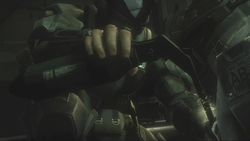Biofoam (short for biomedical foam)[1][2] is a self-sealing, space-filling coagulant and an antimicrobial, tissue-regenerative foam polymer used by the United Nations Space Command as a form of medical first aid. This foam keeps damaged organs in place and helps stop bleeding and hemorrhaging. The medicinal compound is morphophetamine in a polyethyltriphosphate foaming medium dispensed with nitrous oxide. The standard dosage is 10 centiliters (10cL) or 3.38 fl. oz.[3] Within the Unified Earth Government, biofoam is an OTC-legal product; biofoam can be purchased legally "over-the-counter".[2]
Overview
Biofoam canisters are prefilled with an expansion agent and liquid polyethyltriphosphate. The two mix and are exposed to air when biofoam is applied to a wound, immediately producing a foaming reaction. The foam strongly adheres to tissues and simultaneously releases encapsulated medical compounds that advances clotting, disinfects the wound, and eventually numbs pain. After a short duration of time, the foam applied will set and become a semi-rigid, porous mass internally, which forms a hardened skin on regions of the body exposed to air.[2]
Biofoam is rubbed into the skin or injected deeper into the body. It is very painful to use, at least initially, described as feeling like "burning ants crawling around the wound" and "thousands of tiny knives" stabbing the recipient. However, biofoam has been described as being able to numb pain.[4][5][note 1] It is likely that only the application is painful, and that the biofoam quickly numbs the wound after settling. Biofoam does not seem to have this kind of painful reaction when applied to an unwounded area, as the Rookie is seen spraying a small amount on his uninjured fingers and does not react in pain. It is often used as a medical option when there are no medical personnel available. Bottles of biofoam are found in health packs.[6][7] Often UNSC medics will use it as a sealing agent during treatment in field hospital. While exploring the abandoned New Mombasa by himself, the Rookie used civilian biofoam canisters, with the brand name Optican, to heal his wounds, as no military medical supplies were available.
The effects of biofoam are temporary, and after a time, usually a few hours, it simply breaks down. Therefore, it is normally a form of first aid, used only as a temporary sealant until proper medical attention can be sought. In extremely rare cases, allergic reactions to biofoam have been documented. Edema is another rare side effect of biofoam, caused by excess fluid trapped in the body's tissues.[2]
The MJOLNIR Mark VI,[4] MJOLNIR GEN2,[8] and MJOLNIR GEN3[9] armors contain automatic biofoam injectors, which negate the need for their Spartan wearers to use health packs.
Trivia
- Despite the insertion process being rather painful, when biofoam is applied to Romeo's wound in Halo 3: ODST, he sighs with relief, rather than showing signs of discomfort. This might result from his rigorous ODST training, or be due to his relief that he can breathe properly again.
- In Halo 3: ODST biofoam is applied by inserting part of the canister into the wound. In Halo: Landfall however, biofoam is applied like shaving cream (which is most likely what was used in the scene) which could possibly mean that biofoam works internally and externally.
- The closest equivalent in the modern world to biofoam is Quikclot combat gauze, which utilizes kaolin nanoparticles impregnated into gauze. It is designed to stop moderate to severe bleeding and stabilize a combat casualty. However, it is not a foam, and as gauze, it must be packed into the wound. An experimental foam developed in late 2012 by DARPA also bears many similarities to biofoam, as it is capable of packing combat wounds and halting internal bleeding.
Gallery
Biofoam being used in Halo: Landfall.
The Master Chief applies biofoam to Michael Sullivan's wound in Halo 4: Forward Unto Dawn.
List of appearances
- Halo: The Fall of Reach (First appearance)
- Halo: The Flood
- Halo: First Strike
- Halo: Landfall
- Halo: The Cole Protocol
- Halo 3: ODST
- Halo: Evolutions - Essential Tales of the Halo Universe
- Halo 4: Forward Unto Dawn
- Halo: New Blood
- Halo: Last Light
- Halo: The Fall of Reach - The Animated Series
- Halo: Fractures
- Into the Fire (Mentioned only)
- Halo: Envoy
- Halo: Oblivion
- Halo: Shadows of Reach
Note
Sources
- ^ Halo: New Blood, pages 66-67 (Google Play edition)
- ^ a b c d Halo Waypoint: Biofoam
- ^ Halo 3: ODST biofoam texture graphic file
- ^ a b Halo 2: The Official Strategy Guide
- ^ Halo: The Flood, page ???
- ^ Halo: The Fall of Reach, page 91
- ^ Halo: First Strike, page 123 ("William retrieved a can of biofoam from the rover and inserted the tip into the tiny injection port in his armor—pushed it through the skin between his fourth and fifth ribs. He filled his abdominal cavity with the space-filling coagulant/antibacterial/tissue-regenerative polymer.")
- ^ Halo 4
- ^ Halo: Shadows of Reach, chapter 5
Cite error: <ref> tags exist for a group named "note", but no corresponding <references group="note"/> tag was found

